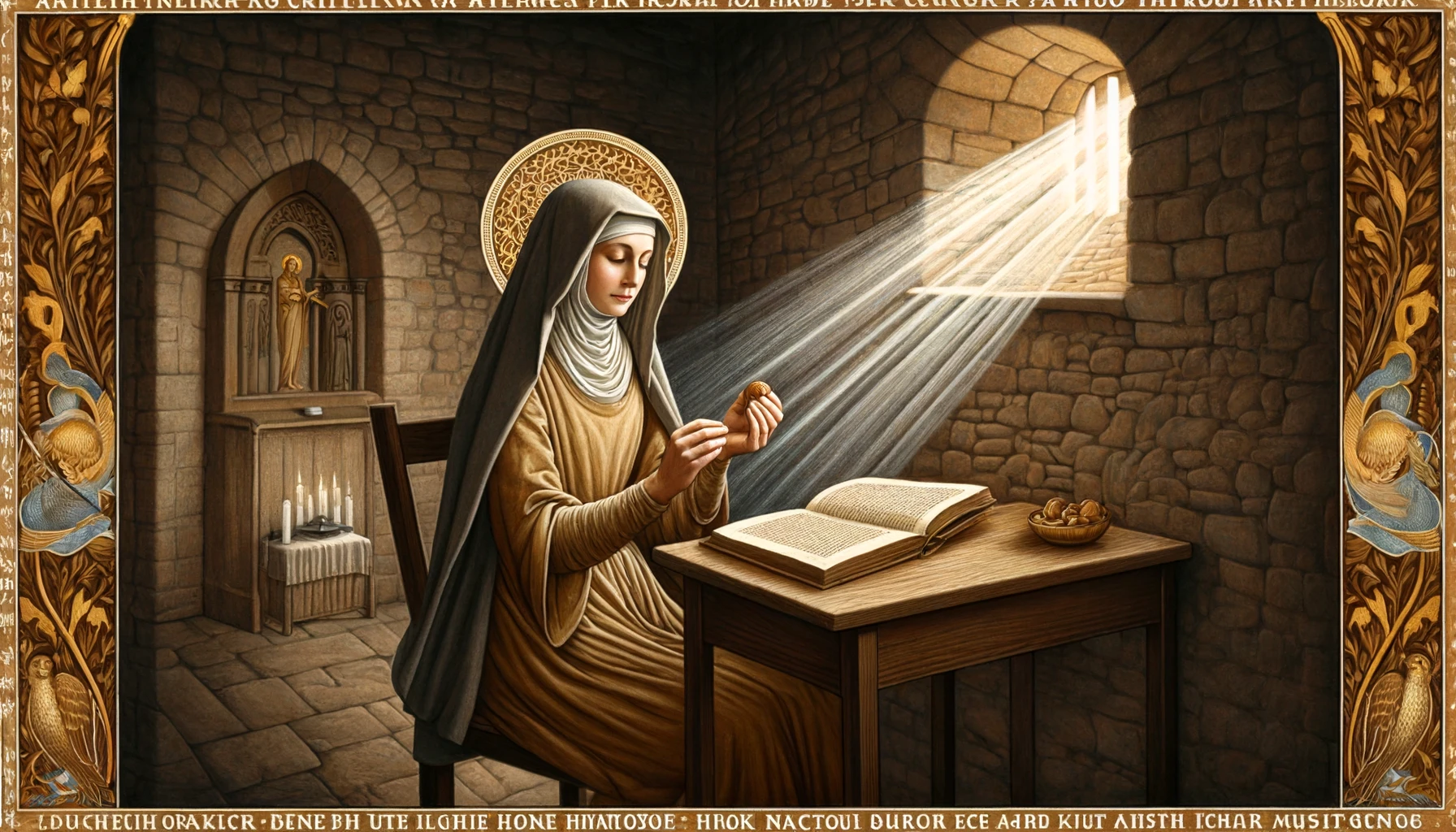
Julian of Norwich (1342–c.1416) is renowned as a medieval mystic and theologian, lauded for her work Revelations of Divine Love, which is considered by many scholars to be the earliest known book in the English language written by a woman (Collins, 2020). A recluse, or anchoress, living in Norwich, England, Julian dedicated her life to prayer and contemplative solitude, gaining profound insights into the nature of God’s love. This article explores key elements of Julian’s spiritual wisdom, highlighting how her teachings find harmony with Scripture and align with the Catechism of the Catholic Church (CCC).
Historical Context and the Revelations
Julian’s life unfolded during the tumultuous 14th century, marked by the Black Death and socio-political upheaval (Bauerschmidt, 1999). In the midst of this turmoil, Julian received a series of visions or “shewings” focused on the Passion of Christ and the immeasurable love of God. These revelations profoundly shaped her belief that “all shall be well” (Julian of Norwich, 2016, p. 58), an enduring theme of hope and trust in Divine providence.
Key Insights in Revelations of Divine Love
- God’s Omnipresent Love: Julian consistently stressed that God’s love is unconditional and unchanging. In a manner resonant with the First Epistle of John—“God is love” (1 John 4:8, New Revised Standard Version)—Julian spoke of God’s desire to draw humanity into closer communion with Him.
- Jesus’s Compassion and Suffering: Julian’s visions repeatedly centered on Christ’s Passion, highlighting that Jesus voluntarily embraced suffering for humanity’s sake (Julian of Norwich, 2016). This reflects Catholic teachings on redemption through Christ’s sacrifice (CCC, 1994, §599–605).
- Hope in Divine Providence: The phrase “all shall be well” is perhaps her most famous passage. Although she lived during dark historical times, Julian’s experiences affirmed her belief in God’s ultimate sovereignty and goodness—a perspective echoed in Scripture (Romans 8:28) and the Catechism’s understanding of Divine providence (CCC, 1994, §302).
Alignment with the Catholic Catechism
1. Revelation and Private Revelations
Julian’s shewings are considered private revelations—subjective mystical experiences granted by God for the edification of the individual and, potentially, the wider Church (CCC, 1994, §67). While these revelations do not add anything new to the deposit of faith, they can deepen understanding and inspire spiritual renewal. Julian’s text serves as a contemplative reflection on core Catholic beliefs concerning salvation, Divine love, and the redemptive act of Christ.
2. The Nature of God as Infinite Love
In line with Catholic teaching, Julian perceives God as infinite love. The Catechism underscores that “God is love” (CCC, 1994, §221), which resonates powerfully with Julian’s mystical experiences. Her emphasis on God’s closeness and care for every individual is consistent with the Church’s teaching that “the Lord is gracious and merciful” (Psalm 145:8).
3. The Humanity and Divinity of Christ
Central to Julian’s visions is Christ’s shared humanity with us and His Divine nature—core Catholic doctrines reflecting the mystery of the Incarnation (CCC, 1994, §464–469). Julian’s meditations on the wounded Christ illustrate her profound devotion to the Passion, mirroring Catholic tradition that encourages faithful meditation on the Cross as a channel of grace and empathy (CCC, 1994, §571–573).
Biblical and Catechetical Resonances
- Romans 8:28 (NRSV): “We know that all things work together for good for those who love God.” Julian’s unwavering confidence that “all shall be well” (Julian of Norwich, 2016, p. 58) strongly echoes Paul’s assurance that God can bring good out of suffering.
- 1 John 4:8 (NRSV): “Whoever does not love does not know God, for God is love.” Julian’s conviction that Divine love is at the heart of creation aligns seamlessly with this scriptural teaching.
- Catechism of the Catholic Church (CCC, 1994, §221): “God’s very being is love.” Julian’s mystical writings unfailingly reinforce the Catechism’s affirmation of God’s identity as Love.
Practical Lessons for Today
- Trust in God’s Providence: In times of uncertainty, we can draw from Julian’s reflections on God’s unwavering presence, recalling that “all shall be well.”
- Meditation on the Cross: Emulating Julian’s approach, Catholics are encouraged to contemplate Christ’s Passion as a path to intimacy with Jesus (CCC, 1994, §572).
- Interior Prayer and Contemplation: Julian’s solitary life reminds us of the fruits of silence and prayer in nurturing a personal encounter with God (Luke 5:16).
Even centuries after her death, Julian of Norwich offers a message of hope and reassurance. With her unwavering focus on divine mercy, she provides a perspective that resonates both with Scripture and the teachings of the Catholic Church. Julian’s abiding conviction in the transforming power of Christ’s Passion continues to inspire believers seeking solace and meaning amid the trials of life.
References (APA Style)
- Bauerschmidt, F. C. (1999). Julian of Norwich and the mysticism of holiness. University of Notre Dame Press.
- Catholic Church. (1994). Catechism of the Catholic Church. United States Catholic Conference.
- Collins, R. (2020). The influence and legacy of Julian of Norwich. Church History Review, 56(2), 45–61.
- Julian of Norwich. (2016). Revelations of divine love (M. L. del Mastro, Trans.). Dover Publications.
- The Holy Bible. (1989). New Revised Standard Version. Division of Christian Education of the National Council of the Churches of Christ in the USA.